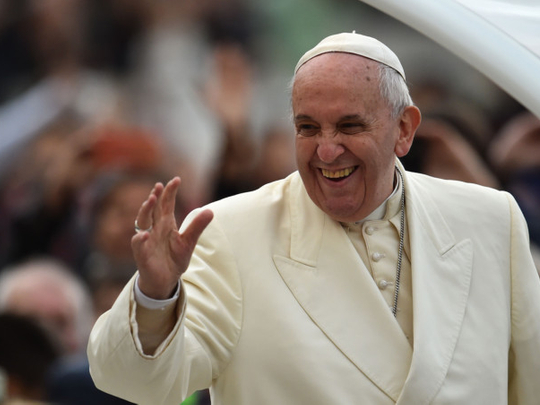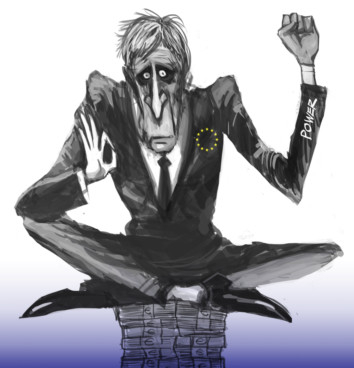
In a speech last week at the European Parliament in Strasbourg, Pope Francis denounced a materialistic Europe that had grown indifferent to human dignity and to the “transcendent dimension”. The first Latin American pontiff went on to compare Europe to a “haggard” grandmother.
For at least a century, elegists have been singing from a song sheet titled ‘The Decline of Europe’. It became especially commonplace after the First World War to invoke biological metaphors while describing the Continent. Most famously, in his The Decline of the West, conservative German writer Oswald Spengler summed up a general pessimism that Europe’s civilisation was mortal, even terminally ill. Spengler argued that modern and secularised Europe had committed itself and the world to a Promethean project with its ideologies of expansion and growth and cults of money and power. Germany had no choice but to embrace the contemporary trend of capitalism and imperialism.
Pope Francis is no parochial nationalist like Spengler, wishing for his side to summon up some barbaric vigour and beat its rivals. Instead, the pontiff represents an older European religious and ethical worldview that now finds most of its adherents outside the West: Among people still striving for the political and financial stability achieved by a majority of Europeans. He finds himself ranged against a pitilessly Darwinian outlook in Europe itself, which, maintained by self-interested political and business elites, seems to go unexamined by apathetic voters and a largely acquiescent intelligentsia.
It “is increasingly intolerable”, he said earlier this year, “that financial markets are shaping the destiny of people rather than serving their needs, or that the few derive immense wealth from financial speculation while the many are deeply burdened by the consequences”.
The Pope realises that the heedless pursuit of private wealth has compromised rather than secured the freedom and dignity of human beings. He cannot but react against the secular cult of money and power, which reduces politics to some procedural aspects such as elections, depriving it of its moral and spiritual imperatives — those that modern democracy and liberalism inherited from the ideals of Christianity. Reading the Pope’s speech in Strasbourg, I was reminded of Thomas Mann’s warning at a dark time in Europe’s history that “we must define democracy as that form of government and of society which is inspired above every other with the feeling and consciousness of the dignity of man”.
Mann was trying to counter the cynicism of people like Oswald Spengler who argued that Germans had to push aside religion, art and philosophy and rededicate themselves to “technics instead of lyrics, the sea instead of the paintbrush, and politics instead of epistemology”. Yet, in one sense, this is precisely what happened in the “miracle” economies of post-1945 western Europe, when its most devastated countries emerged from the ruins of war, and then in post-Communist Eastern Europe after 1989.
Still, Europe has not done — and probably could never do — enough to secure a permanently dominant position in the new world order. The countries that Europe once subjugated have their own claims on the future. China has pragmatically used European techniques of the nation-state and capitalism to emerge as Europe’s tetchy rival as well as indispensable economic partner.
Meanwhile, Europe is confronted with a permanently shrunken economic horizon, and a seemingly unresolvable crisis. More troubling, it seems to have none of the far-sighted leaders who sagaciously rebuilt the Continent after the Second World War: Jean-Claude Juncker is no Jean Monnet, and nothing about Angela Merkel and Francois Holland reminds one of Konrad Adenauer and Charles de Gaulle.
“Right in front of our eyes,” the Polish thinker Adam Michnik laments in his new book The Trouble with History, “we can see the marching parade of corrupt hypocrites, thick-necked racketeers, and venal deputies.” If voters grow cynical and listless, it is because “today, in our world,” Michnik writes, “there exists no great idea of freedom, equality and fraternity.”
One response to this worldwide impasse of materialism is a “blind rebellion” by the “defeated and the bitter, the excluded and the degraded”. The radical disaffection that in Europe is channelled through rising right-wing parties is embodied elsewhere by full-blown insurgencies and authoritarian movements. The Pope has done us all a service in stressing that the world forged by Europe’s post-Christian ideologies urgently needs a fresh vision — perhaps, one that is not wholly scornful of the “transcendent dimension”.
— Washington Post
Pankaj Mishra, a Bloomberg View columnist, is the author of From the Ruins of Empire: The Intellectuals Who Remade Asia.









